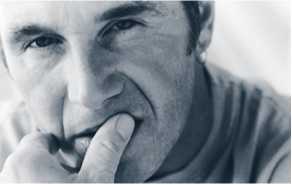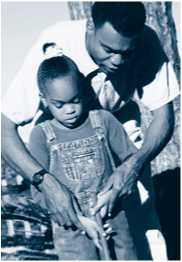
http://www.dbsasgv.org/wp-content/uploads/2017/11/menanddepression.pdf
Angry? Tired? Feeling hopeless?
It’s ok, it happens to a lot of guys.
DBSA
Depression and Bipolar Support Alliance
We’ve been there. We can help.

David has a great job, a nice home, and a loving family. Everyone thinks he has it made. But almost every night he comes home from a hard day’s work, has a few beers, and spends the evening on the couch. He’s bored with everything.
Bob blows up at the smallest things – he gets so agitated in traffic that his face turns red, he punches the steering wheel and yells at other drivers.
Jim is exhausted every night when he gets out of class. He doesn’t hang out with his buddies anymore and hasn’t seen his girlfriend in weeks. Hejust sits alone in his dorm room watching television.
The scenes are common. Who hasn’t been frustrated with traffic, been tired at the end of the day or become bored with things now and then? We all have. But when feelings of irritably or sadness last for a long time, become overwhelming or start to interfere with other parts of your life, it might be a sign of something more serious: depression.
You’ve probably heard about depression before. People may have told you it’s not a real illness and that a person shouldjust snap out of it, or that real men don’t talk about their feelings. The fact is that depression is a real illness (like diabetes or asthma) that affects over six million men in the United States each year. It is nothing to be embarrassed about. It happens to a lot of guys.
Clinical depression is different from normal feelings of irritability or sadness in three ways.
How intense the mood is: With depression, the feelings are much more intense.
How long it lasts: A bad mood is usually gone in a few days, but clinical depression lasts two weeks or longer.
How much it interferes with your life: A bad mood does not keep you from going to work or school or doing the things you like to do.
There is no shame in seeking help. In factjust the opposite is true: it takes courage to admit that you need help.
You’re Not Alone
Depression affects people of every race and economic status. While the illness affects both men and women, men typically have a different experience.
Men don’t usually talk about feeling sad or lonely, instead, they are more likely to talk about being tired, having difficulty sleeping or losing interest in friends and enjoyable activities.
Men deal with depression in different ways, too. They tend to keep feelings to themselves. Many try to cope with their symptoms in unhealthy ways, including excessive use of alcohol or drugs, violent outbursts, dangerous activities or burying themselves in work.
For 20 years I got drunk every day and slept about 3 hours a night. Sometimes I’d get up at 4 am and work around the house. I couldn’t understand why that upset my wife. Slowly my life got out of control. When I was working on getting sober, my counselor suggested seeing a psychiatrist about depression. I didn ’t like the suggestion, but it only took a few weeks to realize that is was the right thing to do. Today, I follow my doctor’s instructions, see my counselor regularly and I’m staying sober.
I feel so much better.
– Art, 51 years old, married, father of two.
Depression Affects Guys of All Ages

Recent studies have shown that depression occurs earlier in life than previously thought. Young boys who may have difficulty recognizing and discussing feelings of depression may talk about being sick, refuse to go to school or cling to a parent. Teenagers often have difficulties with school and use alcohol and drugs.
There is a misconception that depression is a normal part of aging. But while men must learn to cope with life-altering events as they grow older – change of jobs, increased aches and pains, loss of family and friends – they do not need to suffer with depression.
I tried to hide emotions, except for anger. I had crying bouts too numerous too list, and went to the depths of despair.
I refused to seek help despite knowing that I needed it. I told myself so many lies and slid i
 nto alcohol and drug use. My inability to get off the couch except to go to work or bars was especially painful for my sons. I am not out of the woods yet, but at least I understand that I have an illness that can happen to anyone.
nto alcohol and drug use. My inability to get off the couch except to go to work or bars was especially painful for my sons. I am not out of the woods yet, but at least I understand that I have an illness that can happen to anyone.
— Chuck, 43 years old
I didn’t realize I had depression until I was out of high school. At the age of 15, I felt 50 and was ready to die. I felt I had lived long enough and was tired of trying to fight for my life. Once I started to talk about my “secret” I realized I wasn ’t alone and that helped me seek treatment for my illness.
– Gregg, 20 years old
Helping a Friend or Family Member
Men often have difficulty recognizing and talking about feelings. They may not recognize symptoms of depression in themselves or may be embarrassed to seek help. It is often a partner, family member, or a friend who points out patterns of behavior that suggest there is a problem. If you think someone you know may be struggling with depression, the best thing you can do is encourage him to talk to a health professional. Point out the changes in behavior you have noticed and suggest that he go to his doctor. Remind him that seeing a doctor for depression is no different than seeing one for high blood pressure or arthritis. Gentle reminders might be needed to get him to make the appointment. If depression is diagnosed, encourage him to stay with his treatment and provide ongoing support and feedback.
Symptoms of Depression
Not everyone experiences depression the same way. Some people experience many symptoms; somejust a few. If you experience five or more of these symptoms for two weeks or longer, or if any of them interfere with work, school, family or social activities, talk to your doctor or a mental health professional. Do not try to diagnose or treat yourself.
• Irritable, empty, sad mood most of the day, nearly every day
• No interest in or pleasure from activities once enjoyed
• Major changes in appetite or body weight
• Insomnia or sleeping too much
• Feelings of restlessness
• Fatigue, exhaustion, lack of energy
• Feelings of worry pessimism or worthlessness
• Inability to concentrate or make decisions
• Thoughts of death or suicide
You might also have other symptoms such as anxiety, unexplained aches and pains, or increased use of alcohol or drugs. If you or someone you know has thoughts of death or suicide, contact a medical professional, clergy member, loved one or friend immediately or call the National Hopeline Crisis line at 800-SUICIDE.
Bipolar Disorder
Bipolar disorder (also known as manic depression) is a treatable medical illness characterized by changes in mood, thought, energy and behavior. With bipolar disorder, a person’s mood can alternate between the two poles of mania (highs) and depression (lows). Mood swings can last for days, hours, weeks or months. Unfortunately, bipolar disorder is often misdiagnosed. When you talk to your doctor, think about how you’ve been feeling over the past several months and tell him or her about any changes in mood you’ve noticed, even periods of high energy that may have felt good at the time.
Symptoms of Mania
• Feeling energetic, high, better than good, or unusually irritable for at least one week
• Extremely high self-esteem; feeling like you can do anything
• Decreased need for sleep without feeling tired
• Talking more than usual
• Racing thoughts
• Distracted easily
• Increase in goal-directed activity, restlessness
• Excessive pursuit of pleasure (e.g., spending sprees, sexual indiscretions ) without thought of consequences
Because depression and bipolar disorder are illnesses that affect moods, thoughts and behaviors, they are often referred to as mood disorders.
Treatments Work

Treatments vary with each individual, but the good news is that they work for most people. You and your doctor and/or therapist should review all your options in order to determine the best treatment strategy for you. Typically, the most effective treatment plans include three things: Talk therapy, medication and support.
Talk Therapy
Psychotherapy (talk therapy) is an important part of treatment for many people. Talk therapy helps you explore behaviors and modify patterns that contribute to your depression. It’s important to be honest with your therapist and not be afraid to talk about things that you might think are embarrassing. Work with your therapist early in your treatment to set goals you would like to accomplish.
Medication
You and your doctor should work together to determine if medication is the right treatment option for you. Medications are often used to help relieve the symptoms of depression to allow you to explore and modify behaviors. The medications used to treat mood disorders are not addictive and will not alter your personality. It can take time to feel their full effect -sometimes as long as six weeks – so it’s important to stick with it. At a minimum, your doctor may suggest you take medication for one year, though many people take medications throughout their lives, the same as someone living with diabetes or high blood pressure.
Some people experience side effects from medication, such as dry mouth, drowsiness, restlessness, weight gain or nausea. Some medications can affect sexual function in both men and women, though this effect is less common with some of the newer medications. Often, side effects will lessen or disappear in a couple of weeks. Your doctor may suggest adjusting the medication dose or trying a different medication if your side effects continue. Never stop taking your medication or change your dose without discussing it with your doctor.
Herbal Remedies
Some herbal remedies and supplements have been marketed for treating depression. It is important to remember that “natural” does not always mean safe. Some herbal remedies may weaken the affects of other medications you are taking, and may affect your heart, liver or kidneys. Talk with your doctor before trying any herbal remedy.
Peer Support
Peer-to-peer support groups can provide a place to learn from other men who have gone through what you are going through. Meeting others can help you understand that your illness does not define who you are and you can learn from others who have been there.
With a network of over 1,000 DBSA support groups, no one with depression or bipolar disorder needs to feel alone. Each group has a professional advisor and appointed facilitator. Members are people living with depression or bipolar disorder and their friends and family. To find the DBSA support group near you, visit our web site at www.DBSAlliance.org/findsupport.html or call (800) 826-3632.
Communicating with Your Health Professional
Open and ongoing communication with your health provider(s) is essential to the successful treatment of mood disorders. Sometimes it helps to bring a list of important topics with you to your appointment. You may want to take notes during your discussion, as there will be a lot of information for you to remember.
Things to tell your health provider(s)
• How you have been feeling and for how long.
• How your day-to-day life has been affected. For example, missing work, not spending time with family and friends, drug/alcohol use, etc.
• Other illness you may have, medications (including over the counter) you are taking and the names and phone numbers of other health providers you are seeing.
Questions to ask your health provider(s)
• Is medication necessary? If so, what are the benefits and drawbacks (including side effects) of different options? How much will you be taking, how many times per day? Should you take it with or without food? What should you do if you experience side effects?
• Does he or she have recommendations for a talk therapist in your community?
• Would a peer-led support group be helpful?
• How can you reach your provider(s) in an emergency?
• Will treatment affect any other health conditions, e.g., diabetes, heart disease?
• When should you expect to start feeling better?
Wellness Lifestyle

As with any illness, maintaining a healthy lifestyle will help you manage your depression. Try to incorporate the following into your daily life.
• Get plenty of sleep. Stick with a regular sleep routine.
• Exercise regularly.
• Set aside time to be with friends and family and do things you enjoy.
• Watch your diet. Eat balanced meals. Avoid caffeine, sugar and heavily salted foods.
• Follow your treatment plan: see your talk therapist, take your medications as prescribed, and attend your support group meetings.
• Avoid drugs and alcohol.
My father committed suicide at age 47. He was a brilliant man with a loving wife and 7 children, a great job and the rest of his life to look forward too. Now it seems clear he had depression long before it was diagnosed and only after his death did the family realize the pain he had been in. If only people talked more openly about their feelings and emotions and were taken more seriously when saying, “I feel depressed.” If you think someone you know needs help, don’t wait until it’s too late.
– Janet, 26 yeas old
Please help us continue our education efforts.
We hope you found the information in this brochure useful. Your gift will help us continue to distribute this information and help men with depression and their loved ones recognize symptoms and seek help.
Yes, I want to make a difference. Enclosed is my gift of:
□ $100 □ $50 □ $20 Other $_
NAME
ADDRESS
CITY STATE COUNTRY ZIP
DAYTIME PHONE E-MAIL
□ Check (payable toDBSA) □ Money order □ VISA
□ MasterCard □ Discover Card □ American Express
ACCOUNT NUMBER EXPIRATION DATE
SIGNATURE
□ I wish my gift to remain anonymous.
□ Please send me_donation envelopes to share.
□ Please send me information on including DBSA in my will.
□ I have enclosed my company’s matching gift form.
□ I’d like to receive more information about mood disorders.
□ Please send all correspondence in a confidential envelope.
If you would like to make your gift a Memorial or Honorary tribute, please complete the following:
□ In memory of/in honor of (circle one) _
□ Please notify the following recipient of my gift:
RECIPIENT’S NAME ADDRESS
CITY STATE COUNTRY ZIP
Please send this form with payment to:
Depression and Bipolar Support Alliance
730 N. Franklin Street, Suite 501, Chicago, IL 60610-7224 USA Questions? Call (800) 826-3632 or (312) 642-0049 Credit card payments may be faxed to (312) 642-7243.
Secure online donations may be made at www.DBSAlliance.org.
DBSA is a not-for-profit 501(c)(3) Illinois corporation. All donations and bequests are deductible based on federal and state IRS regulations. Consult your tax advisor for details. All information is held in strict confidence and will never be shared with other organizations. Thank you for your gift! Men 04
DBSAlliance.org
We’ve been there. We can help.
Depression and Bipolar Support Alliance
The Depression and Bipolar Support Alliance (DBSA) is the leading patient-directed national organization focusing on the most prevalent mental illnesses. The organization fosters an environment of understanding about the impact and management of these life-threatening illnesses by providing up-to-date, scientifically based tools and information written in language the general public can understand. DBSA supports research to promote more timely diagnosis, develop more effective and tolerable treatments and discover a cure. The organization works to ensure that people living with mood disorders are treated equitably.
Assisted by a Scientific Advisory Board comprised of the leading researchers and clinicians in the field of mood disorders, DBSA has more than 1,000 peer-run support groups across the country. Three million people request and receive information and assistance each year. DBSA’s mission is to improve the lives of people living with mood disorders.
Depression and Bipolar Support Alliance
730 N. Franklin Street, Suite 501 Chicago, Illinois 60610-7224 USA Phone: (800) 826-3632 or (312) 642-0049 Fax: (312) 642-7243 Web site: www.DBSAlliance.org
Visit our updated, interactive website for important information, breaking news, chapter connections, advocacy help and much more.
This brochure was reviewed by DBSA Scientific Advisory Board member George S. Alexopoulos, M.D., of the Weill Medical College of Cornell University, and Ken Heideman of DBSA Boston.
Production of this brochure was made possible by a grant from the American Psychiatric Foundation.
DBSA does not endorse or recommend the use of any specific treatments or medications for mood disorders. For advice about specific treatments or medications, individuals should consult their physicians and/or mental health professionals.
Men 7/04
©2004 Depression and Bipolar Support Alliance Models used for illustrative purposes only.
